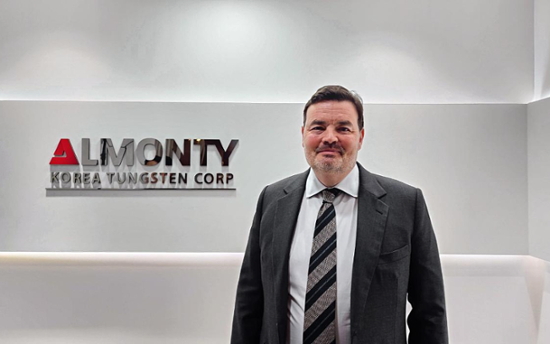Almonty Industries CEO Lewis Black / Courtesy of Almonty Industries
Canadian Firm Tackles Gender Barriers in Mining
In a notable move amidst stringent labor laws in South Korea, Almonty Industries has embraced female participation in mining, a field traditionally dominated by men. Women have been prohibited from underground work for over 70 years due to the Labor Standards Act, which only allows exceptions for medical procedures or media coverage.
Despite attempts to amend this law by lawmakers, including Rep. Ji Seong-ho, efforts were unsuccessful last year. Local council member Oh Se-gil attempted to rally public support in June to classify the restriction as “unconstitutional,” but to no avail.
Korea Coal Corp. has faced criticism for having the lowest percentage of female employees among major state-run enterprises in the country. The situation began to shift when Mimi, a member of K-pop group Oh My Girl, became the first woman to work underground in Korea, inspired by a television show filmed at a former coal mine.
Almonty Leads by Example
Contrary to this pervasive gender gap, Almonty Industries is making strides by hiring women at its Korean subsidiary, Almonty Korea Tungsten Corp. (AKTC), set to begin tungsten production in Yeongwol County, Gangwon Province, in June 2024. CEO Lewis Black emphasized the valuable contributions of women to essential business functions like human resources and finance.
“Currently, women comprise 19% of our workforce at AKTC, and we are committed to increasing this representation,” Black stated.
The Global Context
According to the World Bank, women’s representation in the global mining workforce stands at only 15%, hindered by various challenges such as physically demanding roles, legislative obstacles, and limited advancement opportunities.


Sangdong tungsten mine in Yeongwol County, Gangwon Province / Courtesy of Almonty Industries
Benefits of Gender Diversity
Black noted the benefits of incorporating women in roles traditionally held by men as “remarkable,” recognizing gender diversity as a strategic advantage for the company.
Despite compliance with local labor laws, Black acknowledged advancements in mining technology and safety, making modern mines like the Sangdong Mine among the safest in the world. “We envision a future where anyone, regardless of gender, can work safely in the pits once traditional risks are mitigated through technology and automation,” he added.
Global Shifts in Mining Policies
As international awareness of gender equality grows, many countries including the U.S., Canada, Australia, and Scandinavian nations have opened previously restricted mining jobs to women. In 2022, Ukraine lifted its ban on women working underground due to labor shortages caused by the ongoing conflict. Additionally, mining companies in Illinois previously faced substantial payouts due to discriminatory hiring practices against women in coal production roles.
“Legal frameworks are evolving in several regions to allow women’s access to mining opportunities, ensuring that safety measures are strictly followed,” said Black. This reflects Almonty’s belief that the mining industry can and must be inclusive, tapping into diverse talents to drive innovation and sustainability.


